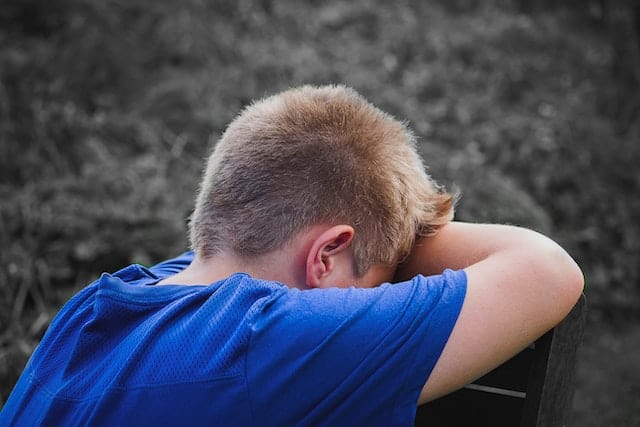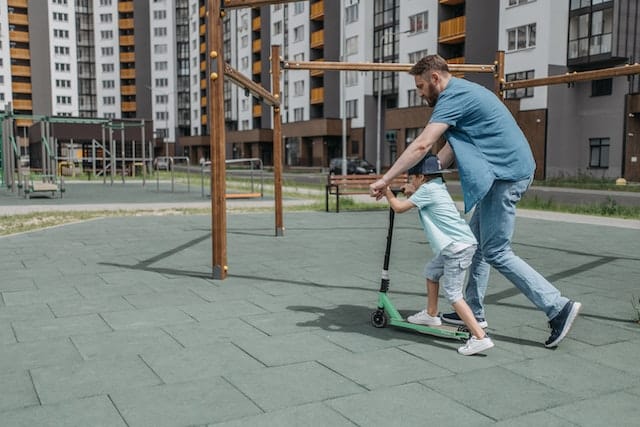Parents of teenagers often worry about their children’s social lives. It can be concerning when a teenager doesn’t seem to have any close friends or social activities outside of school. This can leave parents feeling helpless and unsure of how to help their child.
For some teenagers, isolation can be a choice. They may prefer spending time alone or have a small circle of friends. However, for others, isolation can be a sign of a deeper issue such as anxiety, depression, or social anxiety disorder.
In these cases, it’s important for parents to understand the underlying causes of their child’s isolation and seek appropriate help.
Key Takeaways
- Understanding the causes of teenage isolation is crucial in helping parents support their children.
- A lack of social life can impact a teenager’s mental health and overall well-being.
- Encouraging healthy social interactions and seeking professional help can be effective ways to help a teenager with a limited social life.
Understanding Teenage Isolation
Teenage isolation is a common concern among parents, especially when their teenage children have no social life. Adolescence is a time of great change, and teenagers often experience a range of emotions that can lead to social isolation.
This section aims to provide an understanding of teenage isolation and its effects on teenagers.
Social isolation can lead to loneliness, depression, anger, fear, and worrying. Teenagers who experience social isolation may feel like they are missing out on important experiences that their peers are having. They may feel like they do not fit in with their peers, leading to negative thoughts and feelings.
Teenagers who experience social isolation may also develop negative patterns of thinking and behavior. They may become more withdrawn and avoid social situations, which can lead to further isolation.
They may also become more anxious and worried about social situations, which can make it even harder for them to connect with others.
It is important to understand that social isolation is not always a choice. Some teenagers may struggle with social skills or may have trouble making friends. Others may be dealing with mental health issues that make it harder for them to connect with others.
Parents can help their teenage children who are experiencing social isolation by providing emotional support and encouragement. They can also help their children develop social skills and find ways to connect with others.
This may involve encouraging their children to join clubs or activities that interest them or helping them find ways to connect with peers who share their interests.
In conclusion, social isolation can have a significant impact on teenagers, leading to negative thoughts and feelings. Parents can help their teenage children who are experiencing social isolation by providing support and encouragement and helping them develop social skills.
The Impact of Social Life on Teenagers
Social life plays a crucial role in a teenager’s development, affecting their emotional and mental well-being. A healthy social life helps teenagers develop social skills, build positive friendships, and learn how to navigate peer pressure.
On the other hand, a lack of social life can lead to negative consequences such as isolation, low self-esteem, and poor social behavior.
High school is a critical time for teenagers to establish a social life. It is where they spend most of their time with peers and form their identities. Positive social interactions during this time can lead to long-lasting friendships and a healthy social life in the future.
However, if a teenager does not have a social life in high school, it can lead to feelings of loneliness and isolation.
The teenage brain is still developing, making social interaction an essential aspect of their emotional and cognitive development.
A healthy social life can help teenagers regulate their emotions, develop empathy, and improve their communication skills. In contrast, a lack of social interaction can lead to emotional distress and poor social behavior.
Peer pressure is a common occurrence during teenage years, and a healthy social life can help teenagers navigate it. Positive friendships can provide a support system and help teenagers make better decisions.
However, a lack of social life can lead to vulnerability to negative peer pressure and risky behavior.
In conclusion, a healthy social life is crucial for a teenager’s development. It helps them build social skills, establish positive friendships, and navigate peer pressure. A lack of social life can lead to negative consequences, including emotional distress, poor social behavior, and low self-esteem.
Parental Role in a Teen’s Social Life
Parents play a crucial role in their teenager’s social life. They can either be a positive influence or a negative one.
Here are a few ways parents can help their teen develop a healthy social life:
Trust
Trust is the foundation of any relationship, including the one between parents and their teenagers. Parents need to trust their teens to make good decisions and to be responsible.
When parents show trust, it helps their teens feel more confident and independent. This, in turn, can help them develop better social skills and make more friends.
Open Communication
Open communication is essential for any healthy relationship. Parents should encourage their teens to talk to them about their social lives, including their friends, activities, and any problems they might be having.
When parents listen and offer support, it helps their teens feel heard and valued. This, in turn, can help them develop better social skills and build stronger relationships.
Privileges
Parents can use privileges as a way to encourage their teens to develop a healthy social life. For example, they might allow their teens to go out with friends on the weekends if they maintain good grades and follow household rules.
This can motivate teens to be more responsible and to make good choices when it comes to their social lives.
Overall, parents can have a significant impact on their teenager’s social life. By showing trust, encouraging open communication, and using privileges as a motivator, parents can help their teens develop healthy social skills and build strong relationships.
The Influence of Technology and Social Media
Technology and social media have become ubiquitous in modern society, with the majority of teenagers using various devices and platforms to communicate and connect with others.
While technology has undoubtedly made it easier for people to stay in touch, it has also had a profound impact on social interactions and relationships.
One of the main effects of technology and social media is the phenomenon of FOMO, or Fear Of Missing Out. Many teenagers feel pressure to constantly check their phones and social media accounts to stay up-to-date on the latest news and events, for fear of being left out of the loop.
This can lead to a sense of anxiety and stress, as well as a lack of focus and productivity.
Another factor is the prevalence of online gaming and video games. While gaming can be a fun and engaging activity, it can also be addictive and isolating. Many teenagers spend hours playing games online, which can lead to a lack of social interaction in the real world.
Additionally, some games can be violent or inappropriate, which can have negative effects on a teenager’s behavior and attitudes.
Social media also has a significant impact on a teenager’s social life. While it can be a great way to stay in touch with friends and family, it can also lead to feelings of jealousy, insecurity, and low self-esteem.
Teenagers may compare themselves to others on social media, leading to a distorted view of themselves and their relationships.
Overall, technology and social media have both positive and negative effects on a teenager’s social life. While it can be a great way to connect with others, it can also lead to feelings of isolation, anxiety, and low self-esteem.
It is important for parents and caregivers to monitor their teenager’s use of technology and social media, and to encourage them to participate in real-world social activities as well.
Dealing with Bullying and Peer Pressure
Bullying and peer pressure are two major concerns that parents face when their teenage children have no social life. It is important to understand that bullying can take many forms, including physical, verbal, and emotional abuse.
Peer pressure can also take many forms, such as feeling left out or excluded from social activities.
One way to deal with bullying and peer pressure is to encourage open communication between parents and their children.
Parents should create a safe and supportive environment where their children can discuss their concerns without fear of judgment or criticism. It is important to listen to their children’s concerns and validate their feelings.
Parents can also encourage their children to build self-confidence and self-esteem. This can be done by encouraging their children to pursue their interests and hobbies, and by praising their accomplishments.
Parents should also teach their children to set boundaries and say no when they feel uncomfortable or pressured.
Another way to deal with bullying and peer pressure is to teach children coping strategies. This can include deep breathing exercises, mindfulness techniques, and positive self-talk.
Parents can also encourage their children to seek support from trusted friends or family members, or from a mental health professional if necessary.
In conclusion, dealing with bullying and peer pressure can be challenging, but it is important for parents to create a supportive and safe environment for their children.
Encouraging open communication, building self-confidence, and teaching coping strategies can help children navigate these difficult social situations.
Encouraging Healthy Social Interactions
When a teenager has no social life, it can lead to feelings of isolation and loneliness. Encouraging healthy social interactions can help improve their overall well-being.
Here are some ways to help your teenager develop healthy social habits:
Joining a Team or Club
Joining a team or club can provide your teenager with opportunities to meet new people who share similar interests. This can help them build friendships and develop social skills. Encourage your teenager to explore different options and find an activity that they enjoy.
Sharing Interests
Encourage your teenager to share their interests with others. This can help them connect with like-minded individuals and build relationships. Whether it’s through social media or in-person, sharing interests can help your teenager feel more connected and engaged.
Getting Involved in the Community
Getting involved in the community can provide your teenager with opportunities to meet new people and develop social skills. Encourage your teenager to volunteer or participate in community events. This can help them build relationships and feel more connected to their community.
Role-Playing
Role-playing can be a fun and interactive way for your teenager to develop social skills. Encourage your teenager to participate in role-playing activities with friends or in a club setting. This can help them improve their communication and problem-solving skills.
Developing a Positive Social Dynamic
Encourage your teenager to develop a positive social dynamic by being kind, respectful, and inclusive. This can help them build strong relationships and develop a positive reputation among their peers.
Making New Friends
Encourage your teenager to step out of their comfort zone and make new friends. This can be done by attending social events, joining a club, or simply striking up a conversation with someone new. Remind your teenager that building new relationships takes time and effort, but it’s worth it in the end.
By encouraging healthy social interactions, you can help your teenager develop important social skills and build meaningful relationships.
The Role of Extracurricular Activities
Extracurricular activities can play a significant role in a teenager’s social life. These activities provide an opportunity for teenagers to interact with their peers outside of school and develop new friendships.
In addition, extracurricular activities can help teenagers develop new skills, build confidence, and learn how to work as part of a team.
Art and music clubs, for example, provide teenagers with an opportunity to express themselves creatively and develop their artistic skills. Sports teams, on the other hand, provide teenagers with an opportunity to work together towards a common goal and develop their physical abilities.
Clubs such as 4-H and volunteering organizations can help teenagers develop leadership skills and a sense of responsibility towards their community.
When a teenager has no social life, extracurricular activities can be an excellent way to help them build new friendships and develop social skills.
However, it’s important to keep in mind that not all extracurricular activities will be a good fit for every teenager. Parents and teenagers should work together to find activities that align with their interests and goals.
Overall, extracurricular activities can be an excellent way for teenagers to develop their social skills, build new friendships, and learn new skills. By finding activities that align with their interests and goals, teenagers can have a positive and rewarding extracurricular experience.
Seeking Professional Help
If a teenager’s lack of social life is causing significant distress or affecting their mental health, seeking professional help may be necessary. A pediatrician can be a good starting point for parents who are concerned about their child’s social development.
They can evaluate the teenager for any underlying problems that may be contributing to the issue, such as anxiety or depression.
A mental health professional can also be helpful in addressing the problem. They can provide individual therapy to help the teenager build social skills and self-confidence. Group therapy can also be an effective way for teenagers to practice socializing with their peers in a safe and supportive environment.
In some cases, medication may be necessary to address underlying mental health issues that are contributing to the teenager’s lack of social life. A psychiatrist can evaluate the teenager and prescribe medication if appropriate.
It’s important to remember that seeking professional help is not a sign of weakness. It’s a proactive step that can help teenagers overcome the challenges they are facing and improve their overall well-being.
Community Resources for Teens
When a teenager lacks a social life, it can be challenging for them to find ways to connect with their peers. Fortunately, there are several community resources available to help teens build friendships and engage in social activities.
Neighborhood Resources
Many neighborhoods offer community centers or recreational facilities that host events for teens. These events can include sports leagues, music concerts, and art classes. Additionally, local libraries often host book clubs and other activities that can help teens meet new people.
Youth Groups
Youth groups are a great way for teens to connect with others who share their interests or beliefs. Many churches, synagogues, and mosques offer youth groups that provide a safe and welcoming environment for teens to socialize and participate in community service projects.
Middle Schools
Middle schools often have after-school clubs and organizations that cater to a variety of interests, such as drama, music, and sports. These clubs can be a great way for teens to meet like-minded individuals and develop new friendships.
Overall, there are many resources available to help teens build their social lives. By taking advantage of these resources, teens can develop important social skills and form lasting friendships that will benefit them throughout their lives.
See some similar posts:
Frequently Asked Questions
Having no social life as a teenager can have negative effects on a teenager’s mental and emotional well-being. Teenagers who lack social connections may experience feelings of loneliness, isolation, and depression.
Additionally, they may struggle with developing social skills and miss out on important opportunities to build relationships and learn from their peers.
How can I help my teenage son make friends?
There are several ways to help your teenage son make friends. Encourage him to participate in activities that interest him, such as sports teams, clubs, or volunteer organizations. You can also help him connect with other teenagers by hosting social events or inviting his friends over for dinner.
Additionally, you can encourage him to be kind and welcoming to others, which can help him form positive relationships.
What are some reasons why a teenager may have no friends?
There are several reasons why a teenager may have no friends. Some common reasons include social anxiety, shyness, bullying, or a lack of social skills. Additionally, teenagers who have recently moved to a new area or who attend a new school may struggle to make friends initially.
What are some activities my son can do to meet new people?
There are many activities that your son can do to meet new people. Some examples include joining a sports team, participating in a club or organization, volunteering in the community, or attending social events.
Encourage your son to explore his interests and try new things, which can help him meet like-minded individuals.
Encouraging your son to get involved in social activities can be challenging, but there are several strategies you can use. First, try to find activities that align with his interests and passions.
You can also offer to participate in activities with him or provide transportation to events. Additionally, you can help him practice social skills and provide positive reinforcement for his efforts.
There are several signs that your son may be struggling socially. He may avoid social situations or express feelings of loneliness or isolation.
Additionally, he may struggle with making eye contact, initiating conversations, or maintaining friendships. If you notice any of these signs, it may be helpful to talk to your son and consider seeking professional support.

Iesha is a loving mother of 2 beautiful children. She’s an active parent who enjoys indoor and outdoor adventures with her family. Her mission is to share practical and realistic parenting advice to help the parenting community becoming stronger.



